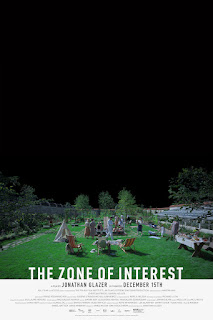☆☆☆☆½
Nothing about The Zone of Interest is easy, a promise this imposingly calm film makes clear even before the first shot—a bucolic lakeside picnic—appears on screen. The movie opens instead on an empty screen, its title taking an ominously long time to fade into nothingness as we sit in the audience and are assaulted by a cacophony of sounds we don't understand. This goes on for an unusually long time, making us squirm in our seats, and it won't be the last time: The Zone of Interest is nothing if not uncomfortable for nearly every second of its running time.
The Zone of Interest is a movie about the Holocaust, a description that will leave you thinking the wrong thing. It's set at Auschwitz, the most infamous of the death factories, hellscapes of terror, torture and murder. But The Zone of Interest never goes inside the fortified exterior walls of Auschwitz. It doesn't need to.
The story it tells is terrifying and almost inconceivably disturbing for a different reason—it follows the story of Rudolf Höss, who was a real SS officer who led the operations at Auschwitz, where more than 2 million Jews were first gassed to death then burned in incinerators that ran all through the night; "loads" of 700 Jews an hour, we are told.
Höss, who is played with a chilling sort of blandness by Christian Friedl, has a wife (Sandra Hüller, equally unnerving) and children, including an infant. Together, they live in a beautiful villa with many rooms, a staff of servants, and two large, verdant gardens in which they like to host parties. Beginning near the front yard and extending the length of the garden is one of the impenetrable walls of Auschwitz.
Almost every hour or every day, the Hösses can hear men and women begging for their lives, screaming in terror, being shot in cold blood. Guns crack constantly. And above the backyard of the home that Frau Höss loves so much are the smokestacks, always belching out their unthinkable ash, emitting a hellish glow at night.
This is the background of their lives. They don't mind, especially since it comes with perks: from toys to shirts to china and silverware to fur coats, the Höss family can select any number of luxuries from the confiscated earthly possessions of the Jews sent to die at Auschwitz. They wear these clothes to lavish garden parties, where they eat, drink and be merry to the sounds of gunshots and bullets thudding against flesh.
All of this, director Jonathan Glazer shows is in long, static, unhurried shots, often composed with wide lenses. You may feel, watching The Zone of Interest, that not a lot happens, that it feels a little dull and ordinary, because this ultimate evil was carried out with bureaucratic banality.
There are inconceivable terrors on display in The Zone of Interest: One of Hess's sons collects human teeth; a local servant girl rinses blood from Höss's shoes; a seemingly mundane business meeting revolves around discussion of a new method to kill as many people as possible as swiftly as possible. None of this seems to disturb Rudolf Höss or his family—except during one peaceful trip to the river when the discovery of human remains causes unexpected panic.
Otherwise, children run and play. Young lovers dare an illicit kiss. Mother and Father fight over simple matters. Life goes on for the Hösses and their friends, though not for the tens of thousands of Jews who, right next door, are being treated like animals led to execution.
The Zone of Interest never asks us to empathize with the Hösses, nor does it suggest we should or could. They are cold and cruel and evil; nothing they do bothers them. But director Glazer has crafted a film that always, in almost every frame, bothers us. There is no rest throughout—the film is suffused with constant noises of cruelty, pain and death. Everywhere, the walls of the Auschwitz extermination camp crowd into view. It is always, always there.
There have been many films about the Nazis who conceived of this unfathomable evil, but never one like this, that presents them as such boring, everyday people, striving to be good at their jobs and earn the lives they have made. How could they have done such things? As easily, The Zone of Interest tells us with unyielding, oppressive certainty, as you or me.
Viewed December 21, 2023 — Vista Theater
1800

No comments:
Post a Comment